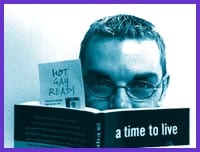In Sault Ste Marie, hard times hit queers harder.
“You’re gonna have a tough time in the Sault already,” says Jason Merling, who recently abandoned the steel town for Toronto. “When you’re gay it’s that much worse.”
Between the difficulty finding work and the isolation and homophobia in the city of 81,000, Merling says many gay men and lesbians leave the first chance they get.
Merling put in more time than most before moving on to pinker pastures. Up until this past summer, Merling and his aunt ran one of the Sault’s only queer friendly spaces – Equality Books on Queen St.
Although the store featured a wide range of resource books, including ones on women’s studies and aboriginal issues, it was targeted for its queer content, says Merling.
He says that while many considered it a haven, others came in just to argue with him.
“I had a woman come in and say, ‘You can’t do this! You can’t open a store like this. The Sault isn’t ready for it.’
“I told her we were doing it because people like her were telling us we can’t. And besides, when will the Sault be ready?”
When Merling came out in the early ’90s, there was nothing. In an attempt to fill that void, he started up a gay youth group with the Algoma AIDS committee.
“It was a peer-to-peer support group with a heterosexual counsellor listening from the background,” says Merling.
The group lasted two years before it lost their meeting space and folded. And now, due to an illness in the family, Equality is gone too.
Although Merling regrets the loss, he’s thrilled to be enjoying the relative freedom of Toronto life.
“I don’t think I would ever return to Sault Ste Marie. Things would have to get very drastic – I’d have to be living on the streets or something – before I’d go back.”
Murray, who won’t reveal his last name, is one of the organizers of Algoma Pride, the Sault’s queer social club which organizes bimonthly dances. He says that visiting Saultites may stay closeted while in town, even though they’re out in their day-to-day life in the big city.
He says that het locals regard homosexuality as something that only exists in depraved cities like Toronto.
“They think that the disease hasn’t reached here yet – being gay here is a disease,” he says.
Margaret Cameron left the Sault when she was 18, and came out four years later in Toronto. She is now Ontario’s transgendered, bisexual, lesbian, gay co-commissioner for the Canadian Federation Of Students.
She says that in terms of queer acceptance, the Sault is lagging behind other northern cities like Sudbury and Thunder Bay.
“Before I would’ve said it’s because [the Sault] is so isolated,” says Cameron. “But after being to Thunder Bay, I think there has to be other influences now.”
Cameron looks forward to the day when the Sault has its own PFLAG chapter.
“It’s difficult because my mother doesn’t have any support,” she says. “She doesn’t know anyone that has a child that identifies as anything other than heterosexual.”
And her mom is why Cameron can’t be really out at home. “It reflects on her,” she says.
Julia Garro traveled throughout Ontario on this summer’s Priscilla Queen Of The North tour, sponsored by the student group Lesbians, Gays, Bisexuals And Transgendered Of U Of T. This is one in a series.

 Why you can trust Xtra
Why you can trust Xtra


